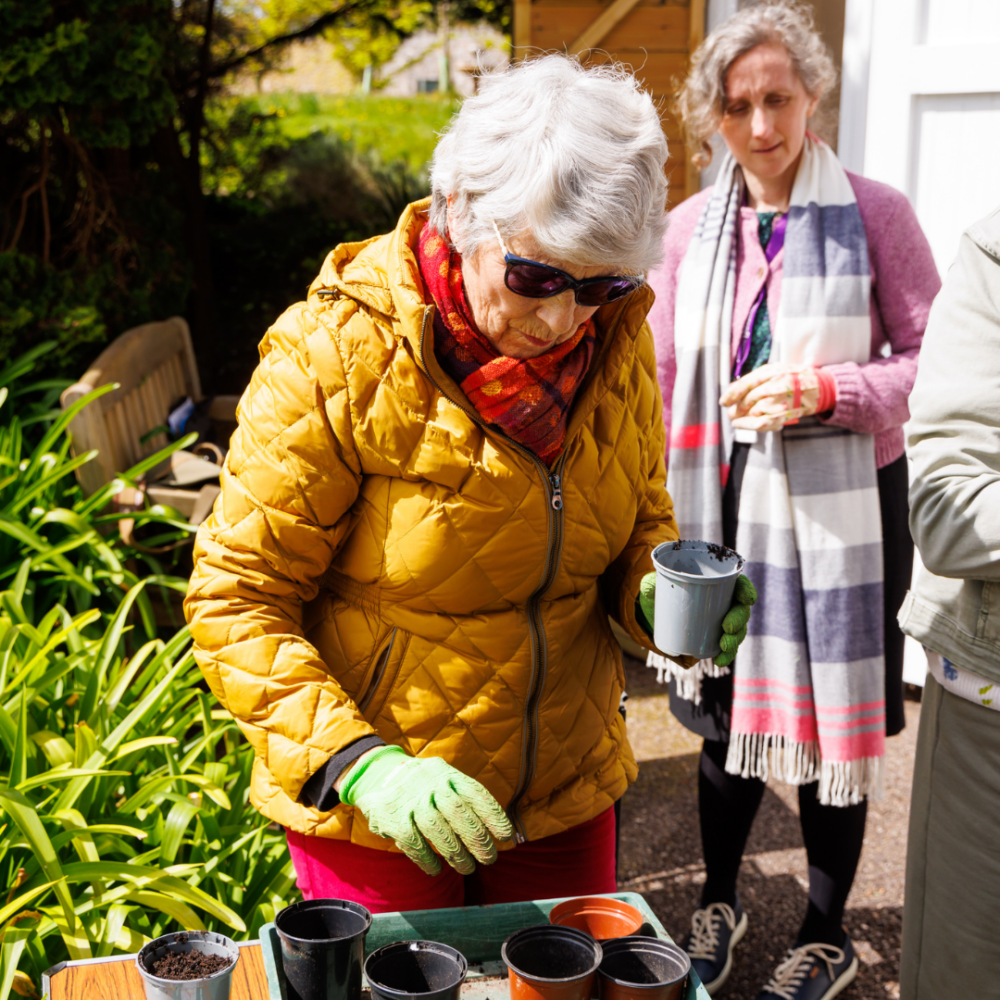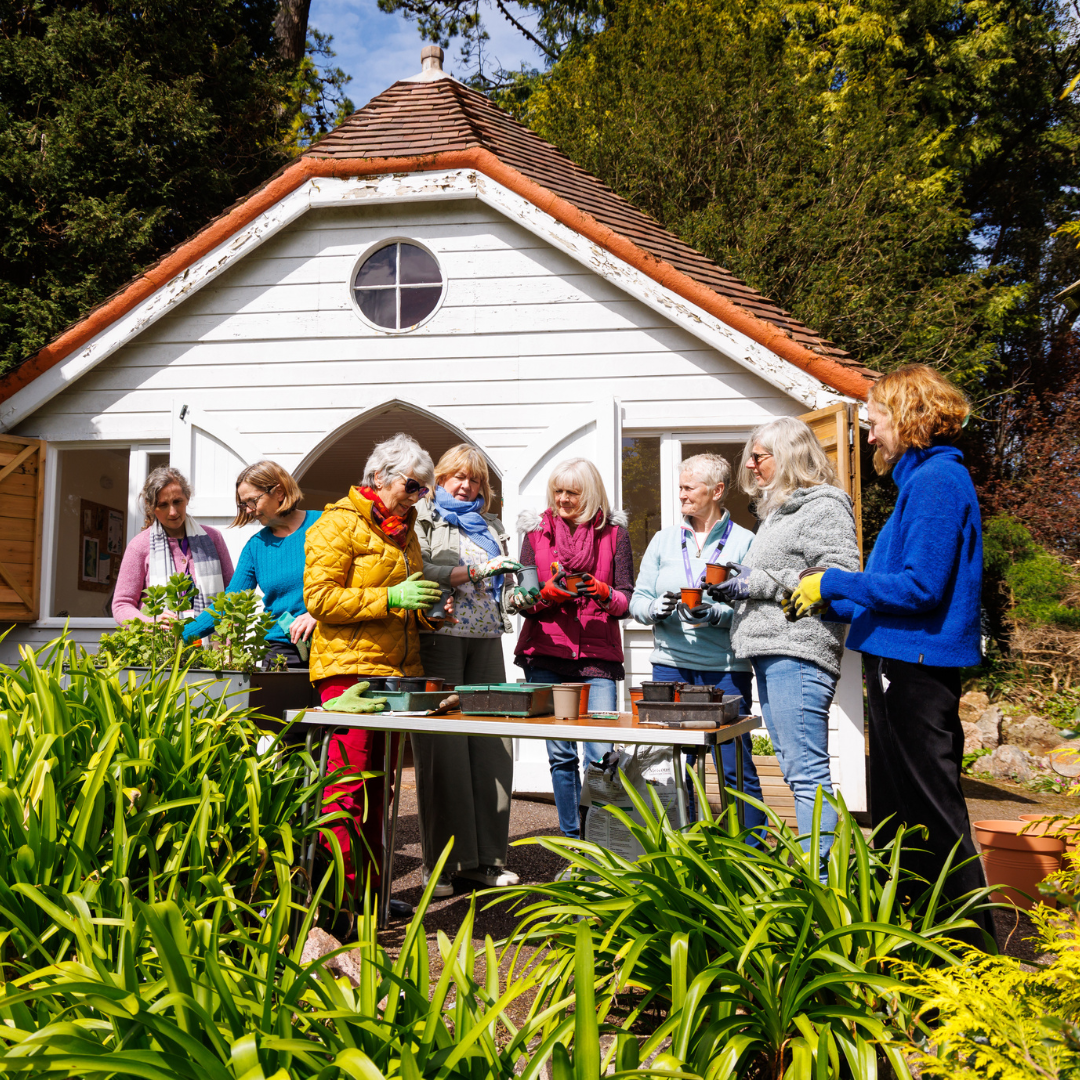Our ‘Spaces for Nature’ bereavement group, coordinated by Anastasia Somerville, our Bereavement and Support Service Coordinator, originated from a desire to bring the healing power of nature to those who are grieving. Here, Anastasia and group members share how nature-based activities provide a safe space to share, express, feel, listen, and reflect. From mindful walks to beekeeping, the activities promote well-being and relaxation and help people to connect with each other on their difficult journeys of grief, finding solace in shared laughter and tears.
Compassionate support and engaging activities
“As well as offering listening support, assisted by at least one of our bereavement volunteers, we also offer regular reflective and creative activities,” says Anastasia. “I often lead a mindful walk, where we explore the plant and animal life in the wonderful Rowcroft grounds, or a simple meditative activity inspired by nature or the arts. I also invite other Rowcroft staff, volunteers, and guests to lead activities. These have included gardening, beekeeping, wreath-making, music therapy, tea ceremonies, iris folding, journaling, and creative writing, to name but a few! We even had a visit from Patrick the Pony. Another very special session was a stone painting session on Valentine’s Day, which was led by one of our bereaved spouses.”
Rowcroft’s support during a difficult time
“I joined the Spaces for Nature group in early October last year,” says Lindsey. “My husband, John, died in the loving care of Rowcroft Hospice at the end of July. I am forever grateful for the group and for Anastasia and Pam’s, our bereavement volunteers, gentle way of organising us. I deeply appreciate that Rowcroft didn’t just ‘cut me off’ after John’s death. As anyone who has experienced a bereavement knows, it is busy and hectic immediately after a death. Then, as everyone returns to their normal lives, as they must, the enormity of the loss hits you. When I received a letter from Rowcroft, it was a lifesaver.”
“Having something reliable and planned to look forward to each week has been absolutely invaluable,” says Stephanie. “There have been quite a few times when I didn’t feel like participating, but not wanting to let the group down gave me the push I needed. I have always been glad I went. I have a very small family, and they all live far away. When my husband was diagnosed with incurable cancer and was undergoing treatment, I became quite isolated. I wanted to spend as much time with him as possible while providing the care he needed. The group has really helped me feel less isolated, and I can’t tell you how valuable that is, priceless I think.”

Finding connection and comfort in sharing experiences
“It was with a certain trepidation that I approached my first session as we stood in a circle and hummed under the trees for music therapy,” says Lindsey. “We then tried out various unusual instruments and vocalised how they made us feel. This isn’t something I would normally feel comfortable with, but when I looked around and saw most of the group in tears, I realised it was okay. We weren’t required to hold it together. Everyone was in the same situation, part of the same horrible ‘club’. I didn’t know any of the group, but I drove home feeling a lot better than when I arrived. I felt an immediate bond with the group members and with those who have joined over the months. The group has let me feel that it is totally okay to be sad, to have tears, and to show my emotions. Everyone is so supportive of each other, and it has been such a comfort.”
“I have felt safe, respected, valued, and welcomed,” says Stephanie. “A very important part of the group for me is that I can share my saddest and craziest thoughts without being judged. I find that I don’t necessarily want to share these thoughts and feelings with my friends or family, as it makes them worry about me (even more).”
“It has been and continues to be a great comfort to share experiences with like-minded people,” says Simone.
Experiencing creative moments
“I really enjoy all the activities and feel much better when I immerse myself in something, like stone painting, pottery, or music,” says Lindsey. “Despite everything, I have laughed as well as cried.”
“I have discovered that I enjoy crafts, in particular the mindfulness they bring,” says Stephanie. “At times, we have had unexpected fun! We have also shared our emotions, like sharing favourite images of our loved ones and doing art exercises. In short, the group has provided a safe space to share, express, feel, listen, and reflect.”
“The walks and activities help to relax and divert the mind from the stress of loss and the problems you have to face alone,” says Simone. “Focusing completely on the activities is so relaxing, and afterwards, it feels like a release from the pressures surrounding you.”

